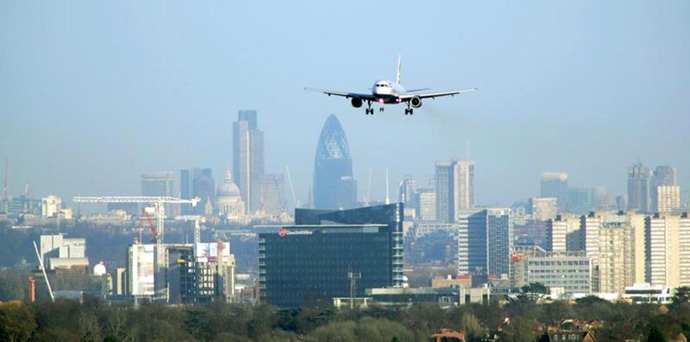International flights into and out of European airspace have been granted a small reprieve by the European Commission, which has suspended their inclusion into the controversial EU Emissions Trading Scheme (ETS) for one more year.
The move, which was announced by the EU commissioner for climate action, Connie Hedegaard, in November, will be welcomed in particular by authorities in the US and India who have been rallying against the scheme, as well as by China who has forbidden its airlines to pay the charge.
Hedegaard said she was going to “stop the clock” on plans to introduce the levy for international flights for one year, after the International Civil Aviation Organisation (ICAO) said it would set up a high-level policy group to come up with a more global approach to tackling aviation emissions. The scheme, however, will remain fully implemented for intra-EU flights.
The new ICAO group, which will be made up of senior government officials from all over the world, has promised to prepare and deliver a global-market-based mechanism (MBM) framework and feasibility report for consideration at ICAO’s next triennial assembly in October 2013.
International Objections Gain Traction
Hedegaard said: “The EU has always been very clear: nobody wants an international framework tackling CO2 emissions from aviation more than we do. Our EU legislation is not standing in the way of this. On the contrary, our regulatory scheme was adopted after having waited many years for ICAO to progress. Now it seems that because of some countries’ dislike of our scheme many countries are prepared to move in ICAO, and even to move towards a Market Based Mechanism (MBM) at the global level.”
According to Hedegaard, because of these developments the EU is now convinced that a global solution for addressing the fast-growing aviation emissions from international aviation is within reach at the upcoming ICAO Assembly in 2013.
She added: “Finally we have a chance to get an international regulation on emissions from aviation. This is a long-sought-for opportunity that we must use. This is progress! But actually to get there, a lot of tough negotiations lie ahead of us. In order create a positive atmosphere around these negotiations, I’ve recommended that the EU ‘stops the clock’ when it comes to enforcement of the inclusion of aviation in the EU ETS to and from non-European countries until after the ICAO General Assembly next autumn.”
Hedegaard’s announcement means that the EU will effectively pause the implementation of the international aspects of its ETS aviation policy by deferring the obligation to surrender emissions allowances from air traffic to and from the EU by one year.
This means that the EU would not require allowances to be surrendered in April 2013 for emissions from such flights during the whole of 2012. Furthermore, monitoring and reporting obligations will also be deferred for such flights.
However, Hedegaard also warned that in the event of the ICAO Assembly failing to move forward, then the EU ETS legislation would be applied in full again from 2013 onwards.
“But let me be very clear,” she added “If this exercise does not deliver – and I hope it does, then needless to say we are back to where we are today with the EU ETS. Automatically. So we are creating this window of opportunity, this great chance. I can only recommend to all parties to engage urgently in taking this issue forward.”
Meanwhile, the suspension is only applicable for international flights entering the EU and all the current obligations relating to all operators’ activities within the EU will remain intact. Furthermore, compliance with the EU law will be enforced in this respect, Hedegaard said.
The implementation of the scheme, which sees aircraft using European airspace faced with an environmental levy, has so far been hugely controversial.
The EU ETS was established in 2003 and initially included only land-based industrial installations. However, from January 1, 2012, the aviation activities of airlines operating flights arriving at and departing from European aerodromes were also included into the scheme.
The legislation currently covers 30 states, including the 27 EU member states and Norway, Iceland and Liechtenstein.
Imperfect Compromise
Despite the latest announcement being a step in the right direction for international flights, airline associations have not fully welcomed the move, calling it an “unfair two-tier system”.
Instead trade bodies such as the European Regions Airline Association (ERA) and the International Air Carrier Association (IACA) have argued that the moratorium should be applied across the board to all airlines.
In response to the announcement, ERA and IACA said the amnesty should go further, and the entire EU ETS scheme should be suspended for all flights until an international solution has been found.
According to the two bodies, by implementing a two-tier scheme where intra-EU operators are still obliged to fully implement the law, the European Commission will “continue to impose cost and complexity on intra-EU operations with little or no overall environment benefit”.
However, they added that giving the international community “breathing space to tackle a global problem” was a “sensible step forward”.
Mike Ambrose, director general of ERA, and Sylviane Lust, director general of IACA, said in a joint statement: “Since the beginning of the legislative procedure that led to the adoption of the EU ETS, ERA and IACA have been supportive of the EU ETS scheme providing it applied to all airlines.
“By introducing a two-tier system the Commission has created a compromise that unfairly penalises many European carriers operating intra-EU flights and their passengers. ERA and IACA call on the EU member states and the Parliament to extend the moratorium to all flights.”
Whether the EU Commission will listen to the complaints from airlines that operate flights within the EU and back down even further on their controversial policy still remains to be seen.
Dominic Welling is editor of GlobalAirportCities.com, a division of UBM Aviation Ltd., London.
